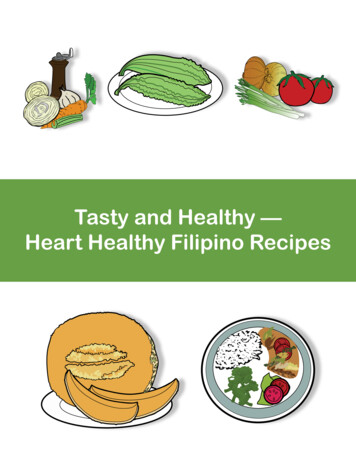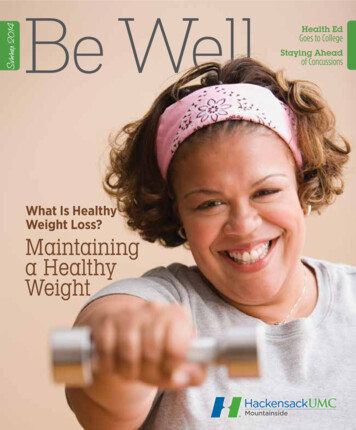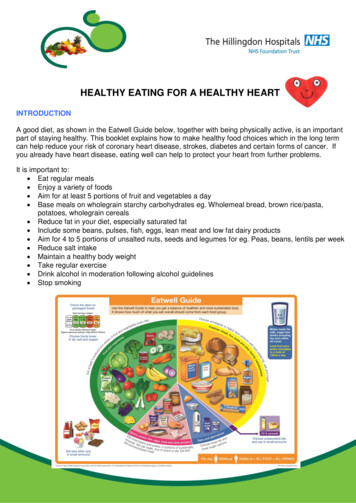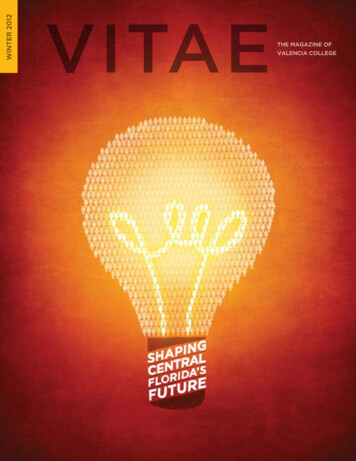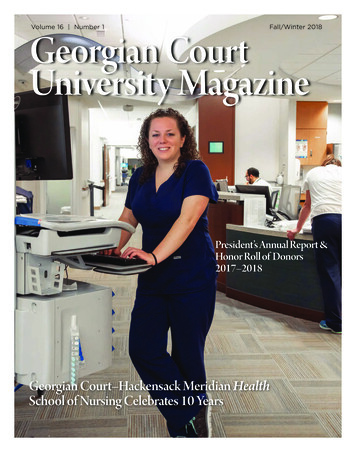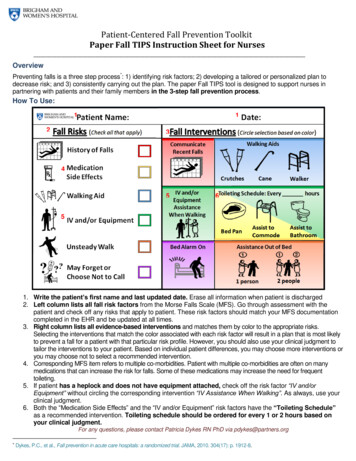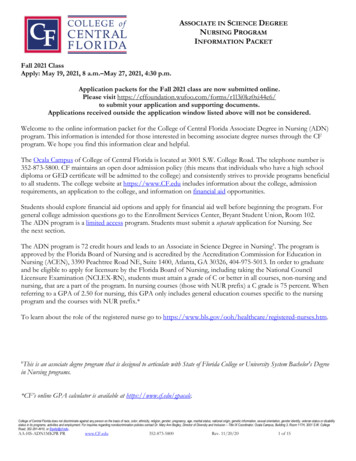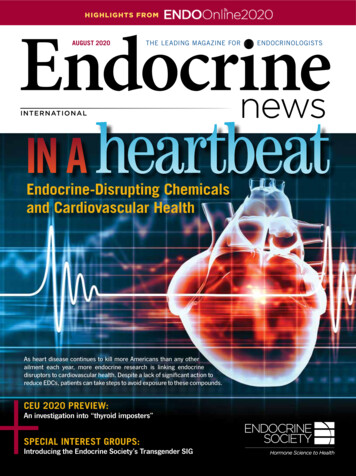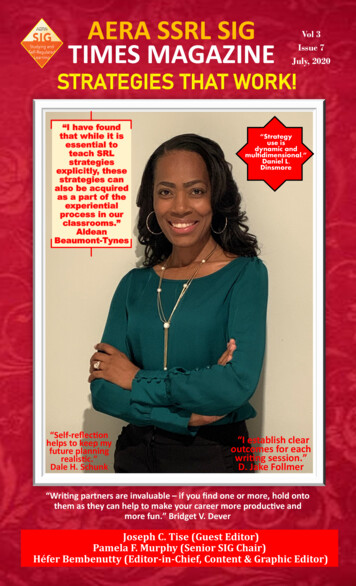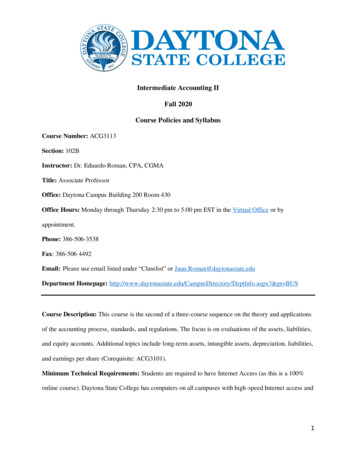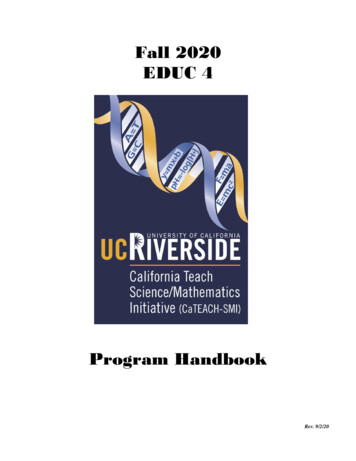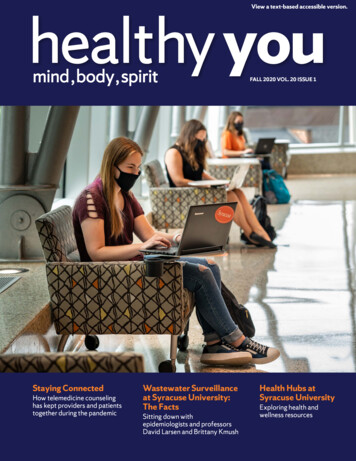
Transcription
healthy youView a text-based accessible version.mind, body, spiritStaying ConnectedHow telemedicine counselinghas kept providers and patientstogether during the pandemicWastewater Surveillanceat Syracuse University:The FactsSitting down withepidemiologists and professorsDavid Larsen and Brittany KmushFALL 2020 VOL. 20 ISSUE 1Health Hubs atSyracuse UniversityExploring health andwellness resources
healthy youmind, body, spiritFALL 2020 VOL. 20 ISSUE 1DEANDAVID B. FALK COLLEGE OF SPORT AND HUMAN DYNAMICSDiane Lyden MurphySENIOR VICE PRESIDENTENROLLMENT AND THE STUDENT EXPERIENCEM. Dolan EvanovichASSOCIATE PROVOST FOR ACADEMIC AFFAIRSChris JohnsonEDITORIAL DIRECTORLuvenia W. Cowart, Ed.D.,R.N.STUDENT MANAGING EDITORCate WillingGRAPHIC DESIGNERBob WondersExecutive ArtSTUDENT EDITORIAL BOARDBen Abelson, Katy Arons, Halle Clark, Connor Eason, Kinley Gaudette, Carrie Goldberg, Sydney Hill,Brooke Kirchner, Siya Kumar, Riley Lucas, Adam Ni, Kaylee Nieves, Nicole Pulido, Anjali Sharma, Cate WillingCONTRIBUTING AUTHORSJanet PeaseFormer Head of Collection and Research ServicesSyracuse University LibrariesRenata Husted ‘17David B. Falk College of Sport and Human DynamicsEDITING SUPPORTMichele BarrettDavid B. Falk College of Sport and Human DynamicsGeorge S. BainCONTACT USHealthy You NewsmagazineDavid B. Falk College of Sport and Human DynamicsWhite Hall, Syracuse NY 13244315.443.9808Healthy You welcomes letters to the editor and story ideasHealthy You is a student-run health magazine of the Department of Public Health. It is a jointly funded publication of the Syracuse UniversityDavid B. Falk College of Sport and Human Dynamics and the Divisions of Undergraduate Studies, and Enrollment and the StudentExperience. This publication enhances, broadens and supports the academic and social experiences of students.The Student Editorial Board is responsible for providing work structure for the magazine’s production, which includes the content, design,production and distribution. The information contained in this publication is not to be construed as medical advice. Readers should consulta medical professional before engaging in any activity described. The contents of this magazine may not be reprinted without the expressedconsent of the editorial director.Syracuse University has paused residential learning. These articles were written prior to this decision and reflect an on-campus residentialenvironment.
CONTENTS2In the KnowNew research in health and wellnessmind3Public Health Faculty SpotlightSitting down with public health professor Bernard Appiah4How to Manage Stress in CollegeExploring meditation and mindfulness techniques5Navigating the Transition to College: Planning is Key!The value of planning and time management6Social Distancing vs. Social IsolationHow to combat isolation during the pandemic7Stress Relief Through YogaExploring the benefits of yoga8Self-Care: Me Time!The importance of allocating time for self-care10 Staying ConnectedHow telemedicine counseling connects providers and patientsduring the pandemic11 Coping with Decision FatigueWhat should I wear today? Should I work out after class?What do I want to eat for lunch?body12 Health Hubs at Syracuse UniversityExploring health and wellness resources14 Maintaining a Healthy Routine During COVID-19Ways to stay active at home15 Wastewater Surveillance at Syracuse University: The FactsSitting down with epidemiologists and professors David Larsen andBrittany Kmush16 Intuitive Eating: Breaking Down Diet CultureListening and responding to your body17 Prolonged Computer UseDangers, and solutions through stretching18 E-cigarette and COVID-19: A Double WhammyThe negative health effects of e-cigarette usage with COVID-1919 Natural as a LifestyleNatural ingredients vs. synthetic products20 The Whole Truth About Whole GrainsUnderstanding the value of eating whole grainsspirit21 Creating a Sense of Community Through VolunteerismA Syracuse student’s experience
IN THE KNOWDiscover new researchin health and wellnessBy Cate Willing & Kaylee NievesPublic Health StudentsDavid B. Falk College of Sport and Human DynamicsTHE IMPORTANCEOF GETTING YOURFLU SHOTWhile getting the flu shot is importantevery year as we enter flu season, coupledwith the dangers of COVID-19, gettingyour flu shot this year is crucial. Septemberand October marked the beginning of fluseason, the best time to get a flu shot. Theflu varies in severity yearly and impactspeople differently. The vaccine is “40percent to 60 percent effective most years”and if you do happen to catch the flu,post-vaccination, the risk of severe illnessis much milder, according to the HarvardMedical School. With many protectivepublic health measures in place becauseof COVID-19, the transmission of the flumay not be as widespread. But because ofcoronavirus, hospital availability and accessto treatment if infected with the flu will bemore challenging than previous years. Asstudents at Syracuse University, we havecommitted to the “Stay Safe Pledge,” whichrequires us to get vaccinated against theflu. To uphold your commitment and keepyourself healthy, visit the Barnes Center,where the flu vaccine is available to allmembers of the University. See the patientportal for scheduling : Harvard Medical School2 healthy you FALL 2020LONELINESS DURING A PANDEMICThe COVID-19 pandemic has brought withit a whirlwind of physical and mental healthissues. Months of isolation have put manyindividuals in uncomfortable positionswhere they are lacking physical touch andsocial interactions. According to The NewYork Times, the lack of interaction withothers can lead to “touch deprivation, whichcan lead to health issues like anxiety anddepressions.” While widespread physicalconnections and touch may be long on thehorizon, there are ways to simulate touchwithin your body at home. To cope withtouch deprivation, researchers encourageactivities like yoga, massages and usingweighted blankets to simulate those touchresponses in the brain.Source: The New York TimesUPCOMINGHOLIDAY SEASONAND COVID-19As the fall season speeds by,traditionally large family and friendrelated holidays like Thanksgiving andChristmas are approaching. While thesecelebrations are generally defined bytheir crowds of family members travelingfrom different places and large buffetstyle meals, the coronavirus pandemicmay have other styles of celebrationin mind. The Centers for DiseaseControl and Prevention has manyrecommendations to lessen the risk ofCOVID-19 transmission and advisesagainst any high-risk transmissionactivities. One of main elementsin staying safe while celebrating isrecognizing the community levelspread of COVID-19: “Higher levelsof COVID-19 cases and communityspread in the gathering location, aswell as where the attendees are comingfrom, increase the risk of infection andspread among attendees,” says the CDC.Implementing preventive measures, ifcommunity risk is not too high—likegathering outside, using disposable andindividually package dishware, wearingmasks and social distancing—is stillcrucial during the holidays and will helpto prevent spreading coronavirus toyour family and your community.Source: The Centers for DiseaseControl and Prevention: HolidayGuidelines
mindPUBLIC HEALTHFACULTY SPOTLIGHTSITTING DOWN WITH PUBLIC HEALTH PROFESSOR BERNARD APPIAHBy Cate WillingJunior, Public HealthDavid B. Falk College of Sport and Human DynamicsBernard Appiah, a new assistant professor of public health inthe David B. Falk College of Sport and Human Dynamics,embodies what it means to have a passion for education, inevery sense of the phrase.Appiah grew up in a small village inGhana, a place so small that he says it isindistinguishable on a map. Appiah wasthe youngest of five children born to hismother and father. His interest in educationstems in part from his father, an originalcommunications expert.In his village, with a population of about1,000, Appiah’s father was known as the‘‘town crier.’’ In this role, also known asthe gong-gong beater, Appiah’s fatherwas tasked with spreading news andinformation across the community. Hereceived information regarding issues suchas agriculture, health and vaccines andpassed on the news to the rural dwellers.The crier used vocal communication torelay the message. This original form ofcommunication, or reporting, interestedAppiah and has stuck with him in his pursuits of communicationsfields, specifically science journalism.Appiah applied his interest in journalism to his position as theeditor of the magazine produced by the Ghana PharmaceuticalStudents Association at the Kwame Nkrumah University of Scienceand Technology in Ghana where studied pharmacy.Although Appiah has studied a variety of technical sciences,his original love for communication always shines through.“Communication just won’t leave me alone,” he says.The timeline of Appiah’s pursuit of higher education can seemintense. He completed two master’s degrees, one in science andtechnology journalism and another in development communicationin the same year, followed three years later by completing adoctorate in public health with a concentration in health promotionand community health sciences. These accomplishments, whilenumerous, were manageable by Appiah, whose nickname in highschool was “Aristotle,” after the Greek philosopher.Appiah says he is “a very big outlier,” compared to the traditionaltrajectory of people in his small village. He was the only one of hisfamily to attend high school and the first in his village to attenduniversity, let alone to receive two master’s degrees and a doctorateof public health.His passion and love for education marked Appiah’s childhood.Accepted into Ghana Secondary Technical School at age 16, hecommuted long distances to school every day, as boarding wastoo expensive. Appiah’s personality and expertise in school led hisbiology master, what the students called their teachers in Appiah’ssecondary school, to take him on as a mentee. At this time, Appiahmoved from home and lived with his biologymaster on campus, an experience thatAppiah recalls fondly.Appiah was now fully immersed in hiseducation and surrounded by those withsimilar interests. The change sparked hisintellectual drive. Appiah and his biologymaster became great companions.“To this date, he is like a father figure tome,” Appiah says. His teacher stood in placeof his late father on Appiah’s wedding day.Appiah credits, in part, his success to thesupport from strangers throughout his life.“Naturally, I am inclined to help,” he says,given the help that he was given throughouthis education, “and I see public health asmore about helping people. It is a perfect fitfor me.”Health promotion, Appiah’s key interest,creates in his mind the perfect intersection of an art, communicationand development, and a science, public health. His backgroundin pharmacy and communication influences much of the healthpromotion work he does today.While adjusting to life in Syracuse, Appiah is keeping busythrough various research projects. He is working with the NationalInstitutes of Health in a six-year project in Ghana to promote blooddonation. For Ghanaians, donating blood is not common because ofcultural beliefs. His goal is to engage first-time blood donors. Muchof Appiah’s researched is centered around using communicationmethods like docudramas to promote healthy behaviors.Appiah says he’s open to students, passionate about health andcommunication, who want to work with him.Bernard Appiah is available at beappiah@syr.edu. For moreinformation regarding his background, visit falk.syr.edu/people/appiah-bernard/Coming in the Spring 2021 Edition: Faculty Spotlight on professorMiriam Mutambudzi, new public health faculty.healthy you FALL 2020 3
mindHOW TO MANAGESTRESSINCOLLEGEEXPLORING MEDITATION AND MINDFULNESS TECHNIQUESBy Sydney HillFirst-year student, Public HealthDavid B. Falk College of Sport and Human DynamicsThink about what you have learned to do to cope with stressas a college student. Those common feelings of anxiety andbeing overwhelmed from your coursework can have negativehealth impacts, but there are ways to manage them. Some peopleknow how to de-stress from what they are going through; othersneed some guidance. Meditation can be a great way to de-stress,especially for college students.Meditation can lower mood disturbance, helping alleviateanxiety and stress levels. Mood disturbance and anxiety arecommon among college students and are often stigmatized.According to a paper in the Journal of American College Healthby Dorothy C. Ibes, Ph.D., most college studentsexperience overwhelming stress and 63.3 percent ofstudents report overwhelming anxiety. Ibes studiedstress in relation to meditation and found meditationreduced stress rates across her focus groups.Students at Syracuse University can relate tobeing stressed and having anxiety due to school,especially with online classes. Tory Ash, a graduatestudent at the University, is studying mindfulness andits relation to student stress levels. She says engaging inmindfulness practices is a way to lower students’ stresslevels. Meditating can also be a great outlet for studentsto deal with their feelings and anxiety.Meditation is oftentimes overcomplicated,but it actually is an accessible practice.To begin meditating, you should finda quiet space where you can sit for a fewminutes uninterrupted. Once you are in acomfortable position, start to pay attentionto your breath. You can close your eyes ifcomfortable and focus on the inhale andexhale of your breath. Take a deepinhale and feel your bellyexpand. Hold the breathand after a few secondsslowly exhale and feel yourbelly contract. You can repeat thisfor a few minutes or longer. Whilemeditating, try to only focus onyour breath and push your currentthoughts and upcoming tasks out of4 healthy you FALL 2020your mind. After any amount of time you are comfortable with,open your eyes and come back to your conscious mind. Breathingtechniques are just one example of meditation that can help youbecome acclimated to the world of mindfulness.Students may feel that they are lacking the interpersonalconnections that characterize college life because of online classesand social distancing. This lack of social outings may also makestudents feel isolated and alone, leading to more anxiety and stress.Meditation could be a useful outlet for students feeling thesepressures of college. There are many ways in which college studentscan begin practicing meditation or mindfulness.Ibes studied students’ stress levels when students meditatedoutside, inside and not at all. This study of meditation practicerevealed that simply meditating outside can lower stress levelsof students. At Syracuse, the many opportunities to engage inmindfulness and meditation include going to the Quadand relaxing or visiting the Crowley Family Mind Spain the Barnes Center at The Arch. If you don’t wantto leave your dorm room, there are other options formediation.The benefits of meditation can be accessed at thetouch of our fingers through a variety of mindfulnessand meditation apps. Recent research by JenniferHuberty, Ph.D., at Arizona State University studied theeffect of mobile meditation apps on stress levels. The studyshowed positive correlation between using the mediationapps and lowering stress and anxiety levels. In a timewhen most of students’ lives are online, this couldbe a useful tool in coping with stress. The studyanalyzed the app Calm, which successfullyreduced stress and anxiety in the students.Ash calls meditation a skill, “something youdevelop overtime in order to benefit yourwell-being.”Meditation may not be for everyone. Butif you are experiencing high levels of stressand anxiety, it may be worth a try.Meditation and mindfulnesscan help you.For more 6?needAccess true
mindNAVIGATINGTHE TRANSITIONTO COLLEGE:PLANNING IS KEY!THE VALUE OFPLANNING ANDTIME MANAGEMENTBy Riley LucasFirst-year student, UndecidedDavid B. Falk College of Sport and Human DynamicsEvery college student knows the feeling of being overwhelmed,drowning in schoolwork. It is not fun, and happens toeveryone, but there are many ways to ensure you stayorganized to minimize these feelings.To stay on top of everything, it is important to keep track ofdeadlines, manage your time wisely and create a schedule foryourself. Staying organized and having a plan for time management,deadlines and schedules are crucial to a successful collegeexperience. These responsibilities can easily slip away when livingon your own for the first time.The first critical step in staying on top of your work in college isto have a planner with all deadlines and assignments written up wellin advance.“My Homework app is a great app if you are someone thatis digital. It will give you alerts to when things are almost duedepending on your needs,” says Elaina Fenstermacher, a coach forstudents with attention deficit hyperactivity disorder and learningdisabilities at Syracuse University. Apps such as My Homeworkand Calendars: Planners & Reminders are one way to keep trackof your schedule and deadlines. When everything is in one place,in a planner or a planning app, it relieves the stress of potentiallyforgetting a deadline for a class.Good time management skills are a necessity. Don’t save all yourwork until the night before it is due. If the work is spread throughoutthe week, it will lead to a stress-free Sunday night. According toFenstermacher, “A lot of my students use this, and I will tell you, itchanges students’ lives, planning out hour by hour your day.”Creating a schedule and routine for your day will encourage youto get everything done and ensures you will still have free time tohang out with friends or watch a show. It is also important to maketime for each specific subject. “When it comes to time managementand study strategies, chunk it out,” Fenstermacher says. “Don’tcram. Break it down and take a two-hour break.”Try to stray away from procrastinating because there is noperfect time to complete an assignment. Fenstermacher says themost important thing for college students to do is be realistic. Beingintentional with the time that you spend on assignments is crucialfor avoiding procrastination. So often we set lofty goals and thinkthese outcomes are just naturally going to come.In addition to counseling at the Center for Disability Resources,the Barnes Center at The Arch offers counseling and workshops tohelp with topics such as time management.For more ?gclid HYxRgxrqvB4EQhZyHVS13lNK2YMxoC EIQAvD g-organized-in-college/healthy you FALL 2020 5
mindSOCIAL DISTANCING VS.SOCIAL ISOLATIONHOW TO COMBAT ISOLATION DURING THE PANDEMICBy Anjali SharmaFirst-year student, Public HealthDavid B. Falk College of Sport and HumanDynamicsCOVID-19 has made this academicyear look different from past years.Sure, it may be easier to attend classfrom your bed, but the impact upon oursocial lives is a cause for concern. Socialdistancing is a public health term oftenused during this pandemic that refers tomaintaining a distance of 6 feet from othersto reduce the spread of the coronavirusand remain safe. People should adhere tosocial distancing guidelines, while workingon maintaining social connections in otherways.It is essential to follow social distancinghealth guidelines, as they are one of themost effective health practices to preventthe spread of the virus, but we have to beaware that we need human interactionto stay mentally fit. Isolation can lead todepression and anxiety, and it can alsoaffect learning abilities.Being isolated can have an effect
White Hall, Syracuse NY 13244 315.443.9808 . Healthy You welcomes letters to the editor and story ideas . Healthy You is a student-run health magazine of the Department of Public Health. It i
